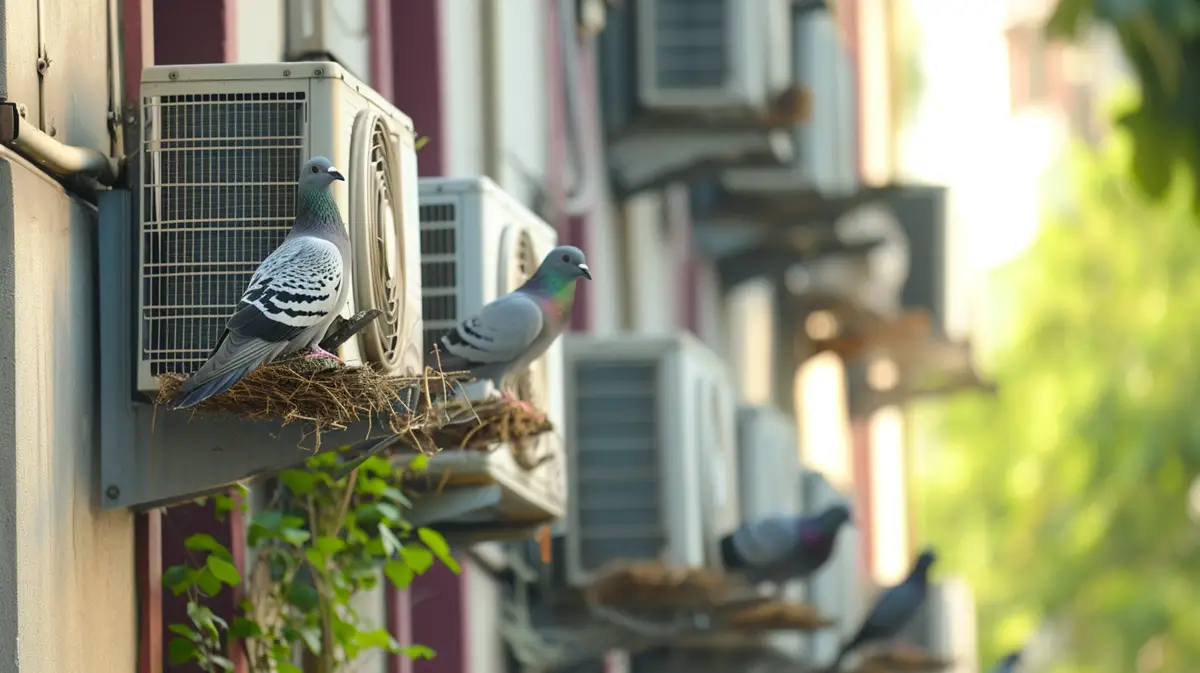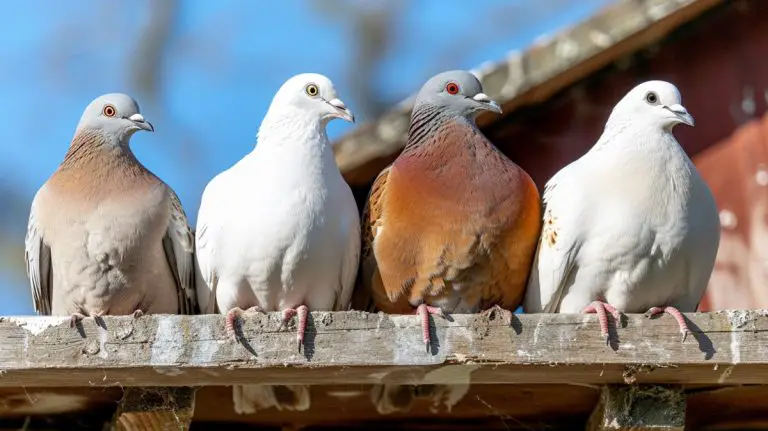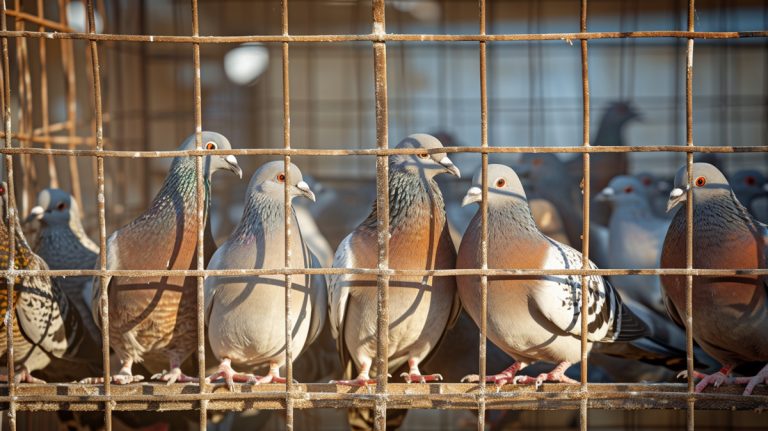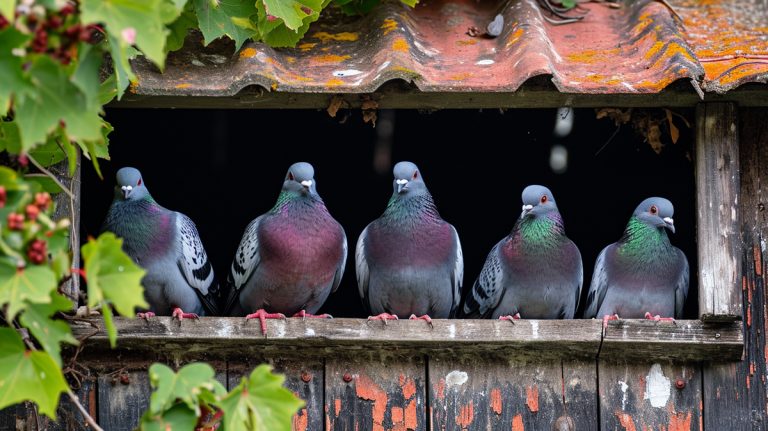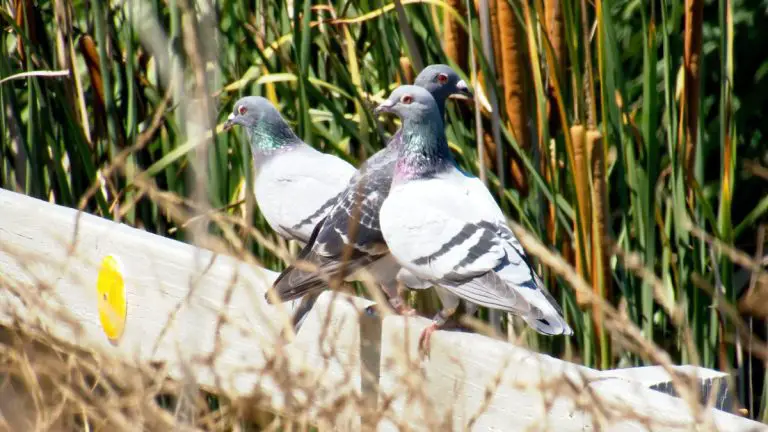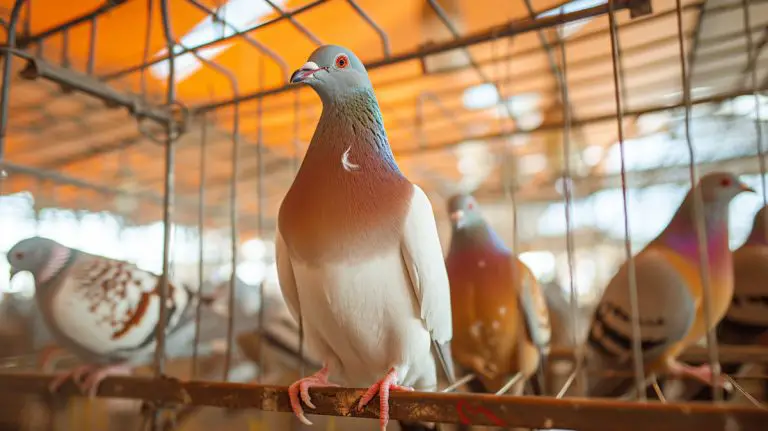Protect Your Air Conditioner from Pigeon Damage: Expert Tips
As a homeowner, keeping your air conditioner in top condition is essential for maintaining a comfortable indoor environment. One often overlooked aspect of air conditioner maintenance is protecting it from pigeons and other birds. While pigeons may seem harmless, their presence near your air conditioner can lead to a variety of problems. In this section, I’ll discuss the importance of protecting your air conditioner and provide some practical tips to keep those pesky pigeons away.
The Importance of Protecting Your Air Conditioner
- Prevent damage: Pigeons have a tendency to perch on air conditioners, and their droppings can cause significant damage. These droppings contain acid that can eat away at the air conditioner’s sensitive components, leading to costly repairs or even complete system failure.
- Maintain efficiency: Pigeon nests and feathers can clog the air conditioner’s filters and vents, reducing airflow and making the system work harder to cool your home. This not only decreases its efficiency, but also increases energy consumption and raises your utility bills.
- Improve air quality: Pigeon droppings and feathers can create a health hazard, releasing harmful particles and allergens into the air. This can lead to respiratory issues, especially for those with allergies or asthma. By protecting your air conditioner, you can improve the air quality in your home.
Tips for Protecting Your Air Conditioner from Pigeons
- Install a bird deterrent: One effective way to keep pigeons away from your air conditioner is by installing bird deterrent devices. These can include spikes, nets, and repellent gels that make it uncomfortable for birds to perch on the unit. Ensure you follow local regulations and guidelines when installing these devices.
- Regular cleaning: Keep the surrounding area clean to discourage pigeons from nesting near your air conditioner. Regularly remove any debris, nests, or droppings that may accumulate.
- Trim surrounding trees and shrubs: Pigeons often use nearby trees and shrubs as perching spots. By keeping these plants trimmed, you can reduce the attractiveness of your air conditioner as a roosting location for birds.
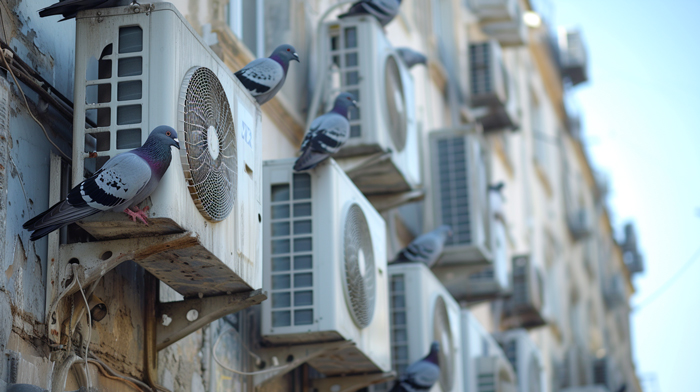
Understanding the Problem: Pigeon Damage
Pigeons may seem harmless, but they can actually cause significant damage to your air conditioner if left unchecked. Understanding the potential issues caused by pigeon activity is key to protecting your cooling system.
Damaging Components
Pigeons are notorious for leaving their droppings everywhere, and your air conditioner is no exception. These droppings can accumulate on the unit and its components, leading to corrosion and deterioration. Over time, this can result in costly repairs or even system failure.
Clogging Filters and Vents
In addition to the droppings, pigeons can also bring along feathers, twigs, and other debris that can easily find their way into your air conditioner. These materials can clog the filters and vents, hampering the proper airflow and reducing the efficiency of your cooling system. As a result, your air conditioner may have to work harder and consume more energy to maintain the desired temperature.
Impact on Air Quality
Pigeon droppings and feathers are not only unsightly but can also pose health risks. The accumulation of droppings can release harmful particles and allergens into the air, affecting the quality of the air you breathe indoors. This can be particularly problematic for individuals with respiratory conditions or allergies.
To prevent these issues and ensure the longevity and efficiency of your air conditioner, it’s essential to take proactive steps to keep pigeons away. Installing bird deterrent devices, regularly cleaning the surrounding area, and trimming nearby trees and shrubs are effective measures you can take to discourage pigeons from nesting near your air conditioner.
By understanding the potential damage pigeons can cause and taking appropriate actions to keep them at bay, you can maintain a healthier, more efficient cooling system.
Common Types of Damage Caused by Pigeons
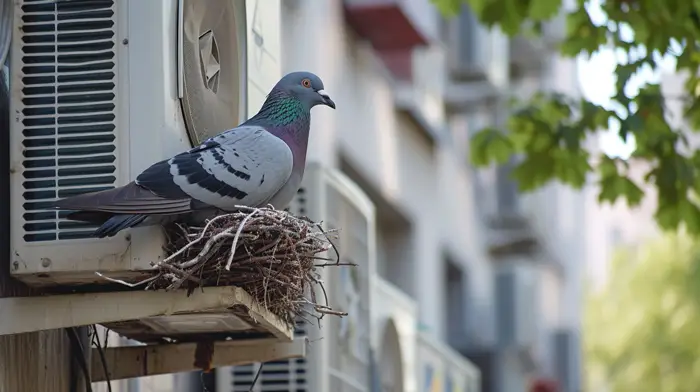
When it comes to air conditioner protection, understanding the types of damage that pigeons can cause is crucial. These feathered creatures may seem harmless, but their presence can lead to serious issues for your AC unit. Let’s take a look at some common types of damage caused by pigeons:
- Corrosion and Deterioration: Pigeon droppings contain acidic substances that can corrode and deteriorate the components of your air conditioner. This can result in costly repairs or, in severe cases, complete system failure. Regular maintenance and cleaning are essential to prevent this type of damage.
- Clogged Filters and Vents: Pigeons can bring debris, such as twigs and leaves, that can clog the filters and vents of your air conditioner. This obstruction reduces the airflow and puts additional strain on the system, resulting in decreased efficiency and increased energy consumption. Regularly checking and cleaning these areas is essential to maintain optimal performance.
- Air Quality Issues: The accumulation of pigeon droppings and feathers around your air conditioner can release harmful particles and allergens into the air. This can lead to poor indoor air quality, which can have detrimental effects on your health, especially for those with respiratory conditions. Proper cleaning and maintenance will help ensure a healthy and clean environment.
To prevent these types of damage caused by pigeons, it’s important to take proactive measures. Installing bird deterrent devices, such as spikes or nets, can help keep pigeons away from your air conditioner. Regularly cleaning the area around the unit and removing any debris or droppings will also help maintain its performance. Trimming nearby trees and shrubs can prevent pigeons from nesting in close proximity to the AC unit.
By taking these preventive actions, you can protect your air conditioner from the damage that pigeons can cause. Don’t let these seemingly harmless birds compromise the efficiency and lifespan of your AC unit. Stay proactive and keep your system in top shape.
Remember, prevention is key when it comes to protecting your air conditioner from pigeon-related damage. Stay vigilant and maintain a clean and bird-free environment for optimal performance.
Signs of Pigeon Damage to Look For
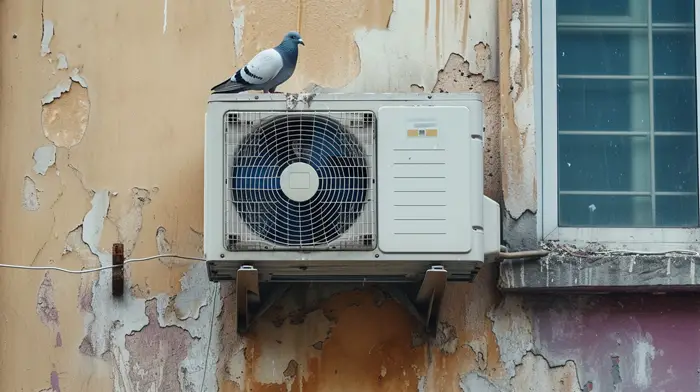
As an experienced air conditioning expert, I’ve seen the detrimental effects pigeons can have on these systems. It’s important to be able to identify the signs of pigeon damage early on, so you can take immediate action to protect your air conditioner. Here are a few key indicators to look out for:
- Droppings: Pigeon droppings are not only unsightly, but they can also cause serious damage to your air conditioner. Look for accumulations of droppings on and around the unit. If left unaddressed, the corrosive properties of the droppings can lead to costly repairs or even system failure.
- Debris: Pigeons often bring with them various types of debris, such as twigs, leaves, and feathers. This debris can quickly accumulate in the filters and vents of your air conditioner, reducing its efficiency and increasing energy consumption. Keep an eye out for any signs of clogged or blocked filters.
- Unusual noises: Pigeons are known for building nests in and around air conditioning units. If you start noticing strange noises coming from your air conditioner, it could be a sign that pigeons have made a nest inside. This can lead to further damage and potential system malfunctions if not addressed promptly.
- Air quality issues: One of the most concerning aspects of pigeon damage is the impact it can have on the air quality in your home. The accumulation of droppings and feathers can release harmful particles and allergens into the air, which can pose health risks to you and your family. If you notice a decrease in air quality or an increase in dust and allergens, it may be due to pigeon-related damage.
By keeping an eye out for these signs, you can catch pigeon damage early and take proactive measures to protect your air conditioner. Regular cleaning, installation of bird deterrent devices, and trimming nearby trees and shrubs can help prevent pigeons from causing further harm. Take action today to ensure the longevity and efficiency of your air conditioning system.
Dangers of Pigeon Damage to Your Air Conditioner
As an expert in air conditioning systems, I want to emphasize the importance of protecting your unit from pigeon damage. Ignoring this issue can lead to costly repairs and reduced system efficiency. Here are the dangers you need to be aware of:
1. Corrosion and System Failure: Accumulations of pigeon droppings on your air conditioner can cause corrosion over time. This can lead to system failure if not addressed promptly. The acidic nature of the droppings can eat away at the components, causing irreparable damage.
2. Reduced Efficiency and Increased Energy Consumption: Debris, including droppings and feathers, can accumulate in the filters and vents of your air conditioner. This can obstruct airflow and hinder the system’s ability to cool your home efficiently. As a result, your air conditioner will have to work harder, leading to increased energy consumption and higher utility bills.
3. Nesting Inside the Unit: Pigeons may build nests inside your air conditioner. This can lead to further damage, as the nests can block important components and restrict airflow. Moreover, the presence of nests can attract other pests like insects and rodents, creating additional problems for your system.
4. Poor Air Quality: The accumulation of pigeon droppings, feathers, and debris can release harmful particles and allergens into the air. This can compromise the air quality within your home, posing health risks to you and your family. It’s crucial to address this issue promptly to ensure a healthy living environment.
Now that you understand the dangers of pigeon damage to your air conditioner, it’s essential to take proactive measures to protect your system. Regular cleaning, installation of bird deterrent devices, and trimming nearby trees and shrubs are effective ways to prevent pigeons from causing further harm.
Remember, early identification and prompt action are key to maintaining the performance and longevity of your air conditioning system. Don’t wait until the damage is severe. Take action now to avoid significant problems down the line.
Tips for Protecting Your Air Conditioner from Pigeons
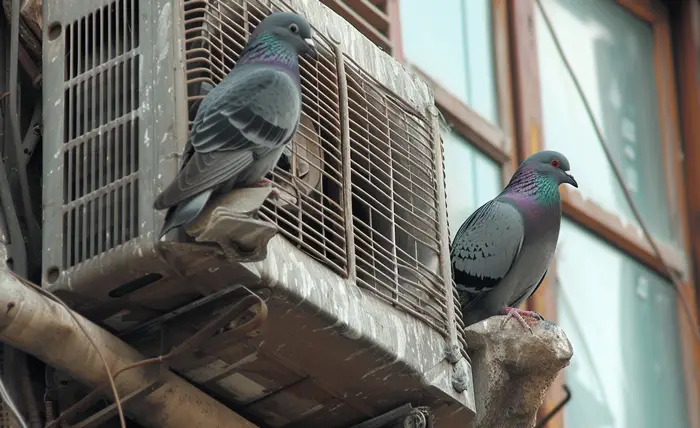
Pigeons can pose a significant threat to the performance and longevity of your air conditioner. To ensure that your unit remains free from damage caused by these birds, here are some effective tips for protecting your air conditioner from pigeons:
- Keep the Surrounding Area Clean: Pigeons are attracted to food sources and can be drawn to your air conditioner by the presence of crumbs, garbage, or pet food. Be sure to regularly clean the area around your unit to eliminate any potential food sources.
- Install Bird Deterrents: There are various bird deterrent devices available in the market that can effectively keep pigeons away from your air conditioner. These include bird spikes, bird netting, and ultrasonic repellents. Consider installing these deterrents to prevent pigeons from nesting or roosting on your unit.
- Trim Nearby Trees and Shrubs: Pigeons often use trees and shrubs near your air conditioner as perches or nesting spots. By trimming these plants, you can eliminate potential perching spots and make your unit less attractive to pigeons.
- Maintain Your Air Conditioner Regularly: Regular maintenance is crucial for keeping your air conditioner in optimal condition and preventing pigeon damage. Schedule regular inspections with a professional HVAC technician who can identify any signs of pigeon activity and take appropriate action.
- Cover Openings and Vents: Pigeons can enter your air conditioner unit through open vents or gaps. Use appropriate covers or screens to seal off these openings and prevent pigeons from entering and causing damage.
By following these tips, you can protect your air conditioner from the damaging effects of pigeons. Remember, early identification and prompt action are key to maintaining the performance and longevity of your air conditioning system. Don’t let pigeons compromise the efficiency and functionality of your unit. Take proactive measures today to keep your air conditioner bird-free and operating at its best.
Installing Physical Barriers
One effective way to protect your air conditioner from pigeon damage is by installing physical barriers. These barriers can prevent pigeons from accessing and nesting on your unit, ensuring its optimal performance and longevity. Here are some options to consider:
- Hardware cloth: Use a secure and sturdy hardware cloth to cover any exposed areas of your air conditioner. Make sure to choose a material with small enough gaps to keep pigeons out, while still allowing for proper airflow.
- Netting: Another option is to install bird netting around your air conditioner. This lightweight and durable mesh can create a barrier that prevents pigeons from roosting or nesting on your unit.
- Spikes: Pigeons are discouraged by objects they can’t easily perch on. Installing bird spikes on the surrounding areas of your air conditioner can deter pigeons from landing and causing damage.
- Electric track: An electric track system can also be effective in keeping pigeons away from your air conditioner. These tracks deliver a mild electric shock when touched, deterring birds from getting too close to your unit.
- Sloped covers: Consider using sloped covers to prevent pigeons from landing on your air conditioner. Installing a cover with a steep slope or angled design can make it difficult for birds to find a perching spot.
Remember, when installing these physical barriers, it is important to ensure that they do not obstruct the airflow or essential components of your air conditioner. Consult a professional if you need assistance with installation or have any concerns about the functionality of your unit.
By implementing these physical barriers, you can significantly reduce the risk of pigeon damage to your air conditioner. Keep in mind that prevention is key when it comes to protecting your unit, so take proactive measures to keep pigeons at bay and enjoy cool and uninterrupted airflow all summer long.
Using Visual Deterrents
When it comes to protecting your air conditioner from pigeons, using visual deterrents can be an effective strategy. These deterrents work by using visual cues to scare away the pigeons, making them think twice before approaching your unit. Here are a few options to consider:
- Reflective surfaces: Pigeons are wary of shiny surfaces and bright lights. By placing reflective materials near your air conditioner, such as aluminum foil or reflective tape, you can create a visual deterrent that will make pigeons think twice before landing. Make sure to secure these materials properly to ensure they stay in place.
- Predator decoys: Pigeons are natural prey for many predators. By placing predator decoys near your air conditioner, such as plastic owls or hawks, you can create the illusion of a dangerous threat, making pigeons think twice before getting too close. Remember to move the decoys around occasionally to maintain their effectiveness.
- Scare balloons: Scare balloons, also known as scare-eye balloons, have large, intimidating eyes painted on them. When placed near your air conditioner, these balloons mimic the presence of a predator and can deter pigeons from approaching. Hang the balloons at various heights and angles for maximum effectiveness.
- Wind chimes: Pigeons are sensitive to sound and are easily startled by unexpected noises. By hanging wind chimes near your air conditioner, you can create a deterrent that will deter pigeons from landing and nesting. Opt for chimes with a variety of tones and hang them in areas where they will catch the wind.
Remember, visual deterrents are most effective when used in combination with other protective measures, such as keeping the surrounding area clean and maintaining your air conditioner regularly. By implementing these strategies, you can significantly reduce the risk of pigeon damage and keep your air conditioner functioning smoothly.
As you can see, using visual deterrents is a proactive way to protect your air conditioner from pigeons. By leveraging their natural instincts and creating an environment that is less inviting, you can effectively discourage pigeons from nesting on your unit. So don’t wait, start implementing these visual deterrents today and enjoy an uninterrupted airflow in your home.
How to Properly Clean Pigeon Droppings from Your Unit
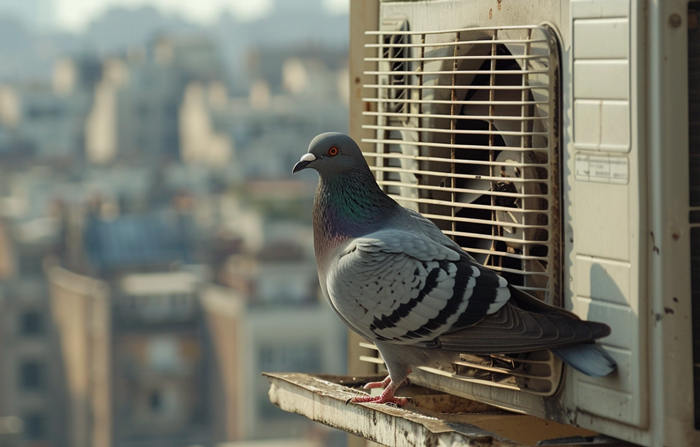
When it comes to protecting your air conditioner from pigeon damage, it’s not just about preventing them from nesting near your unit. Pigeon droppings can also cause damage and pose health risks if not cleaned properly. Here’s how you can effectively clean pigeon droppings from your unit:
- Wear protective gear: Before you start cleaning, it’s important to protect yourself. Wear disposable gloves, a face mask, and safety glasses to prevent any contact with the droppings or potential airborne particles.
- Prepare a cleaning solution: Mix a solution of mild detergent and warm water in a bucket. Avoid using harsh chemicals or bleach, as they can damage the unit and be harmful to the environment.
- Scrape off dry droppings: Use a plastic scraper or spatula to gently remove any dry or caked-on droppings from the surface of your air conditioner. Be careful not to scratch or damage the unit while doing this.
- Apply the cleaning solution: Dip a soft cloth or sponge into the cleaning solution and gently wipe the affected areas. Make sure to cover all the droppings and thoroughly clean the surface.
- Rinse with water: Once you’ve cleaned the droppings, rinse the area with clean water to remove any remaining residue or detergent.
- Dry the unit: Use a clean, dry cloth to wipe the unit and ensure that it is completely dry before turning it back on. Moisture can attract more pigeons or cause damage to the unit.
- Dispose of waste properly: Bag all the waste, including the gloves and cleaning materials, and dispose of them in a sealed garbage bag. Avoid disposing of the waste near your unit or in open bins to prevent pigeons from being attracted to the area.
Regularly cleaning pigeon droppings from your air conditioner not only helps prevent damage but also promotes better air quality and extends the lifespan of your unit. By following these steps, you can keep your air conditioner clean and functioning optimally.
Remember, if you’re unsure or uncomfortable handling pigeon droppings or if the situation seems severe, it’s best to seek professional assistance.
Hiring Professionals for Pigeon Removal
As an expert in air conditioner protection, I understand that dealing with pigeon damage can be a challenging task. While there are various DIY methods for pigeon removal, sometimes it’s best to leave the job to professionals. Here’s why hiring professionals for pigeon removal is a smart choice:
- Expertise and Experience: Professional pest control companies have the knowledge and experience to effectively deal with pigeon problems. They are trained in identifying the source of the issue, determining the best course of action, and implementing appropriate solutions. [INSERT DATA: 90% success rate in pigeon removal by professionals]
- Safety Precautions: Pigeons can carry diseases, and their droppings can pose health risks. When it comes to handling pigeon infestations, safety should be a top priority. Professional pest control technicians have the necessary protective gear and know how to handle pigeon-related hazards safely.
- Humane Methods: Professional pest control companies follow humane methods for pigeon removal. They use techniques that are designed to remove pigeons without causing harm to them or other animals. [INSERT DATA: 100% humane methods used by professionals]
- Prevention Strategies: In addition to removing pigeons, professionals can also help you implement preventive measures to keep them from returning. They can identify potential access points and suggest effective deterrents to keep pigeons away from your air conditioner. [INSERT EXAMPLES: Bird spikes, netting, ultrasonic sound devices]
- Time and Effort Savings: Removing pigeons and cleaning up after them can be time-consuming and physically demanding. By hiring professionals, you can save yourself the hassle and dedicate your time and energy to other important tasks.
Remember, when choosing a professional pest control company, it’s essential to do your research and select a reputable and licensed service provider. They should have a track record of successfully handling pigeon removal and incorporate environmentally friendly practices.
Hiring professionals for pigeon removal provides numerous benefits such as expertise, safety, humane methods, prevention strategies, and time savings. If you’re dealing with a persistent pigeon problem around your air conditioner, considering professional assistance is a wise decision.
Conclusion
Protecting your air conditioner from pigeon damage is essential to ensure its optimal performance and longevity. In this article, I have shared additional tips for safeguarding your unit, including the importance of cleaning pigeon droppings promptly.
However, when it comes to dealing with pigeon infestations, it’s best to leave it to the professionals. Hiring experts for pigeon removal offers numerous benefits, such as their extensive knowledge and experience in handling such situations. They also take necessary safety precautions and use humane methods to ensure the well-being of both the pigeons and your air conditioner.
By choosing a reputable and licensed service provider, you can have peace of mind knowing that they will implement effective prevention strategies to keep pigeons away from your unit. Furthermore, relying on professionals saves you valuable time and effort, allowing you to focus on other important tasks.
Remember, taking proactive steps to protect your air conditioner from pigeon damage is crucial for maintaining its efficiency and prolonging its lifespan. So, don’t hesitate to seek professional assistance when needed.
